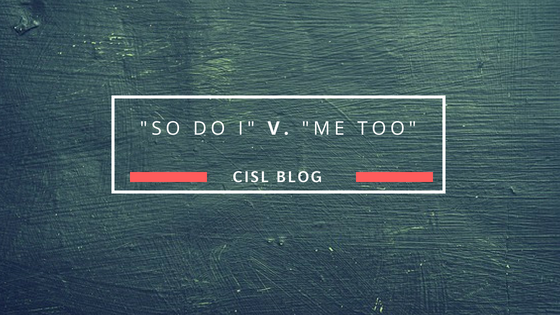
English learners are often confused about when to use SO DO I and when to use ME TOO. Do you know the difference between SO DO I and ME TOO, and when to use them? Read on!
SO DO I vs. ME TOO
Both SO DO I and ME TOO are used as a response to simple statements. The statements must be positive (without the word “no” or “not”). SO DO I is more formal, while ME TOO is more informal.
ME TOO
ME TOO is more informal. It is used in casual conversation.
- I love ice cream. Me too.
- I slept so well last night. Me too.
- I think I’ll order the chicken. Me too.
What about negative sentences? For these, we say ME NEITHER.
- I can’t dance. Me neither.
- I didn’t sleep well last night. Me neither.
- I’m not ordering dessert. Me neither.
SO DO I
SO DO I is more formal. It is used in writing, in more formal conversations, and in presentations.
- I love the book The Sun Also Rises. So do I.
- I think she did an excellent job on his presentation. So do I.
SO + [WORD] + I
Note that we can use SO + [WORD] + I/SUBJECT with other positive statements. The middle word must match the verb or verbs of the first statement.
Use DID if the original positive statement is in the simple past.
- I loved the book Charlotte’s Web when I was a child. So did I.
- I thought he did an excellent job in the interview. So did I.
Use a MODAL if the original statement uses a modal.
- I could order another glass of wine. So could I.
- I can touch my toes. So can Sarah.
- He can speak French. So can I.
Use WILL if the original statement uses the simple future.
- I think I will go to bed. So will I.
- I think I will study Mathematics in college. So will Janet.
Use the BE VERB with be + ing statements.
- I am going camping this weekend. So am I!
- He is going to UC Davis this fall. So are Jill and Thomas.
Negative statements
What about negative statements? We cannot use SO DO I or its variations. We must use NEITHER. Use the form NEITHER + [VERB/MODAL] + SUBJECT. Make sure that the verb or modal from the original statement matches the verb/modal in the “neither” statement.
- I can’t dance. Neither can I.
- I didn’t sleep well last night. Neither did I.
- I’m not ordering dessert. Neither am I.
